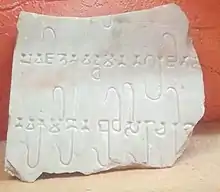
Phanigiri is a Buddhist site[1][2] in Suryapet district, Telangana. It dates to the 1st Century BCE - 4th century CE period.
The site is a major discovery in the history of the early India.[3] It is closely related to the stupa complexes at Amaravati and Nagarjunakonda.
Structure
Phanigiri is a village in Suryapet district, Telangana. It is situated about 40 km from Suryapet city. The place consists of a Buddhist complex which is adorned with a massive stupa along with two apsidal halls with stupas in it.[4]
Two large footprints in the complex are believed to belong to Gautama Buddha. The place also houses three viharas which were once served as the dwelling for the Buddhist monks. Previously the name of the village is Dharmachakrapuram but later it is changed to Phanigir. The name is derived from two words which represent the shape of the hill (phani=snake, giri=hill).
References
- ↑ "Phanigiri on Buddhist tourist circuit: Report". The Hindu. 28 February 2017. Retrieved 28 February 2017.
- ↑ Nanisetti, Serish (30 April 2019). "Rare stucco statue put on show". The Hindu. ISSN 0971-751X. Retrieved 7 March 2021.
Nearly 1,700 years after a life size stucco Bodhisattva was created by craftsmen at Phanigiri at the peak of Ikshavaku dynasty rule, [...] it is one of the rare life-size figures in stucco to be unearthed in India. "[...] We were surprised during excavation as one piece after another was flipped over around 3 p.m. on April 26 at Phanigiri,"
- ↑ Skilling, Peter (2008). "New discoveries from South India: The life of the Buddha at Phanigiri, Andhra Pradesh". Arts Asiatiques. 63: 96–118. doi:10.3406/arasi.2008.1664.
- ↑ "Buddhist site left to ruin in Phanigiri: Report". Telanganatoday. Retrieved 12 November 2017.